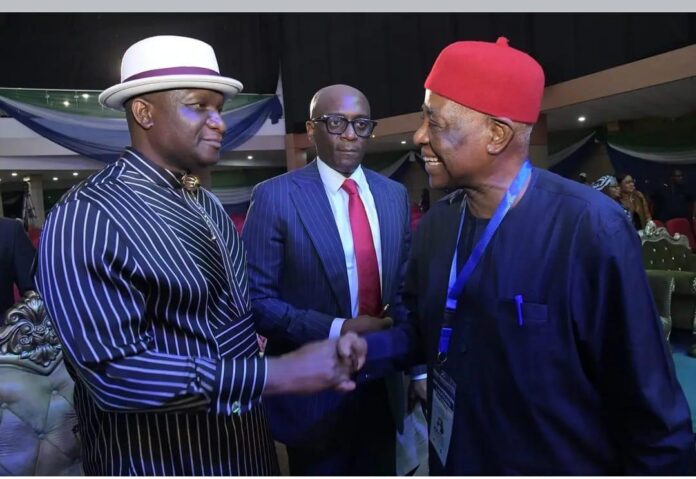By Martins Azuwike
At the Niger Delta Stakeholders Summit held from July 10 – 13 in Port Harcourt, the Managing Director/Chief Executive Officer of the Niger Delta Development Commission (NDDC), Dr Samuel Ogbuku was in his best elements to address the core needs of the region.
With total commitment to doing things differently to make the people have what they actually want through deployment of people – oriented programmes, he left no stakeholder in doubt when he touched base with them that, he had the knowledge, understanding, guts and gumption required to develop the nine oil-producing states that constitute the agency’s main focus.
Since the past 23 years of the Commission’s activities, the general impression of many in the region had been unenthusiastic; but now, the Dr Ogbuku’s – led administration is out to change that narrative and convince critical stakeholders by matching budget expectations and needs with well-tailored projects implementation to transparently meet their needs.
Former President Goodluck Jonathan said it more succinctly that, “NDDC came as a child of necessity, whose strategic role also includes; improving the environment, providing infrastructure, and enhancing the livelihood of the people in the region.
“With the birth of this current leadership of NDDC, people from the Niger Delta have seen some rays of light. Therefore, I encourage the political class not to overstretch the NDDC for them to be able to perform optimally.
“The political class must not frustrate the Niger Delta Development Commission, so that it can optimally perform its duties,” Dr. Good – Luck Jonathan remarked at the summit.
For the President of the Senate, Senator Godswill Akpabio also stated that , “to achieve lasting solutions, we must overcome disunity. Unity among the people of the Niger Delta and the entire nation is not just a choice but a necessity. Through our shared vision, we can overcome the obstacles before us.”
And the general views of participants at the unique summit?
Two factors featured prominently on the scale of keeping promises to the core stakeholders; one is the ability to perform and the other is, the willingness to do it.
From his nimble footwork and strides to redefine development and growth in the Niger Delta region, it is evident that Dr Ogbuku has the two in abundance, and is going with great zeal to make their impact felt.
Hear him: “We will chart a new course for the region. The Summit is a yardstick for feedback and possibly finding ways of improvement in line with the Renewed Hope Agenda of President Bola Ahmed Tinubu. It will not just be an interaction with individuals, but an open interaction with members of the National Assembly, Ministers from the region, and the private sectors, to discuss the Niger Delta and the mechanisms for effective delivery of services and projects.
“We will explore means of reducing recurrent expenditure. While we focus on completing capital projects, only projects that add value to the Niger Delta region will be approved. Our commitment is to work together towards transforming the region, in accordance with the eight Point Presidential Priorities, and the demands of the NDDC Act of 2000.”
This stems from his idea that the summit be pegged on three cardinal objectives comprising; developing strategies for economic growth, translating the Renewed Hope Agenda and articulating a road-map for sustainable development.
He added: “What we have done through the summit is to open up ourselves to accountability. We are working very hard to deliver. What we are doing now is to do things differently by telling our story in the positive way. Check the statistics of NDDC projects, and it cannot be said that the commission has done very well. The people believe in Government policies. I have confidence in Government policies. Make the people believe in you.” Indeed, a back-of-the-envelope check shows without any scintilla of doubts that the Commission has made a clear difference in the Niger Delta region by executing more than 10, 945 projects since 2001 comprising 4,151 roads and bridges, 2, 323 rural electrification, 1,723 building projects, and 642 water projects across the nine mandate states. While most of these have been completed, others are still ongoing.
So, what is he doing differently?
Chief Ogbuku says: “Our focus in 2024 will be on continuous engagement with various strata of NDDC’s stakeholders, in order to grasp and understand the needs of the people of the Niger Delta region.
“We will chart a new course for the region. The stakeholders’ summit and forum will serve as a yardstick for feedback and possibly finding ways of improvement in line with the Renewed Hope Agenda of President Bola Tinubu. It will not just be interaction with individuals, but an open interaction with members of the National Assembly, ministers from the region, and and the private sector, to discuss the Niger Delta and the mechanisms for effective delivery of services and projects.
“We will explore means of reducing recurrent expenditure. While we focus on completing capital projects; only projects that add value to the Niger Delta region will be approved. Our commitment is to work together towards trans forming the region, in accordance with the eight points Presidential Priorities, and the demands of the NDDC Act of 2000.”
That’s not all. Dr. Ogbuku is also aiming for the stars in improving and reconstructing the development matrix of the Niger Delta region. Evidence is strong that roads (including the Ogbia-Nembe Road in Bayelsa State), renewable energy, and other infrastructural projects have been embarked upon in the hinterland of the entire region. The knock-on effect of the projects remains far-reaching. The projects have, in turn, attracted the presence of micro, small and medium-scale businesses by roadside auto mechanics, vulcanizers, kiosks, petty trading, carpenters, welders, and more. The projects have not only opened up such areas, they have also conferred higher value on real estates. They are also helping to solve the problem of unemployment in the areas at their levels. The net effect of this is economic development from the grassroots, and significant improvement in the quality of life of rural dwellers as demand increases, consumption pattern changes, savings and investments are made to further dilate the economy.
In economic development, this is the concept of capital formation in practice. It also demonstrates Dr Ogbuku’s adept strategies in further bringing ideas to life. Implementation of projects in the hinterland, and in the process, economic activities gain attraction, to rave momentum and drive growth in the interest of the larger segment of the society. More so, when the projects and programmes being implemented are products of research-based evidence of what the people want would be abound.
This underscores Dr Ogbuku’s view that it is efficacious for people to meet, especially at the level of the just concluded summit. His words: “Nothing is wrong in bringing people together to brainstorm, but there is also the need for followup. That is why achievement assessment will be necessary before next year’s summit.”
This is supported by former President Jonathan’s view that, we must now evolve ways of managing completed infrastructure, collaborate with Governors (to construct roads and hand over to them, for instance). He also admonished that, the NDDC must now begin to evolve ways on how to ensure the future of the Niger Delta without oil with more focus on improved industrialisation, agriculture, education and skills acquisition.
There is also the critical issue of heavy investments in the oil-rich region.
As in other parts of the country, micro, small and medium-scale entrepreneurs may be present in the region, but the need for heavy industries in the region cannot be dismissed with a wave of the hand. For instance, some International Oil Companies (IOCs) have hived off significant parts of their businesses to Seplat Energies, Oando and others. Ordinarily, analysts argue that NDDC, an interventionist agency of Government on the affairs of the Niger Delta region, ought to have been given the benefit of first refusal in the acquisition of those assets that could be profitably managed to increase revenue and improve the wellbeing of the people of the region.
But the agency seems incapacitated now by the scope and scale of the Act that brought it into existence. Experts say therefore, that the Act needs to be reviewed and amended not only to make it possible to invest on behalf of the oil-bearing states, but also to seize the day in working with its partners to make the region investment ready.
And the most important views expressed at the unique event was, “All hands have to be on deck” to ensure the Niger Delta region moves into a time of good fortunes, as the region belongs to all of us as Chief Samuel Ogbuku-led administration has shown sincerity of purpose with their programmes and events since they came on board.
The days of sitting on the fence are over. The Niger Delta region belongs to us all, and if the board fails, it means we have all failed because, in one way or another, their performance affects everybody. But if they succeed, not only will the region feel the impact, but we will also welcome our “glory days.” That is why experts believe that, this is the way to go as the Commission moves the affairs of the region from transaction to transformation.
Newslinedaily…Your path to credible news




